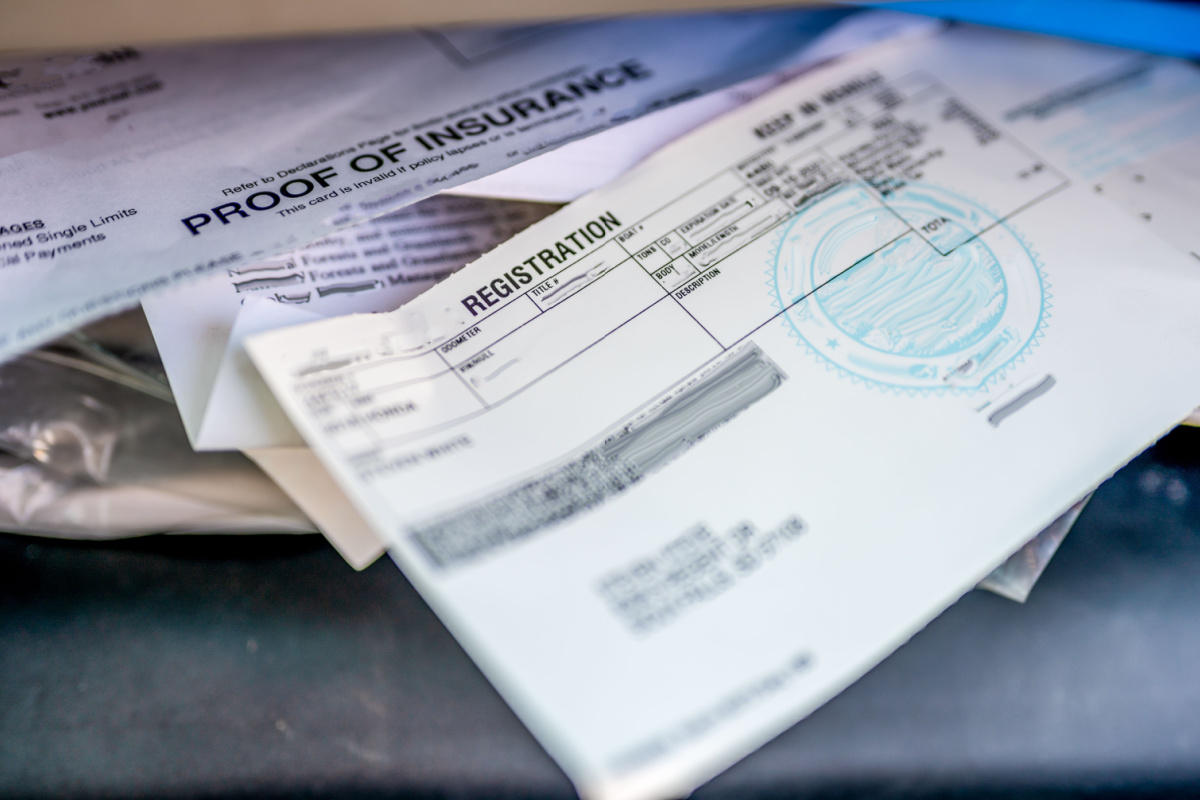Understanding Registration Loans: How They Work and Their Benefits
If you’ve ever found yourself in a pinch – your wallet is light, expenses heavy, and there's a car in your driveway that's almost yours but not quite – registration loans could offer you a way to tap into the car’s equity for a financial boost.
 If you’re searching for quick financing, registration loans might be an option if you have existing equity in your vehicle. Whether it's a sudden bill or just a deep dive into your options, we're here to walk you through everything registration loans have to offer.
If you’re searching for quick financing, registration loans might be an option if you have existing equity in your vehicle. Whether it's a sudden bill or just a deep dive into your options, we're here to walk you through everything registration loans have to offer.
What Is a Registration Loan?
A registration loan is a type of short-term loan that allows borrowers to use their vehicle's registration as collateral to secure the loan. Unlike a title loan, which requires the borrower to own their vehicle outright, a registration loan only requires the borrower to have a vehicle registered under their name.
This means that even if the borrower is still making payments on their vehicle and does not yet hold the title, they may still qualify for a registration loan. The amount of money a borrower can receive from a registration loan typically depends on the equity they have in the vehicle, which is the difference between the vehicle's current market value and any outstanding loan balances on the vehicle. Lenders will assess this equity to determine the loan amount they may be willing to offer.
For example, imagine Sarah needs money to cover emergency expenses that cost $2,000, but she doesn't have the funds available. Sarah is in the midst of paying off a car valued at $10,000, with $4,000 still owed to the lender. This situation leaves Sarah with $6,000 in equity in the car – essentially, the car's value minus what's still owed. Sarah applies for a registration loan and, if approved, may receive a percentage of the car’s equity – between 25% and 50% of the $6,000.
What Do You Need to Get a Registration Loan?
To apply for a registration loan, applicants must prepare and present several key documents that verify their identity, income, vehicle ownership, and ability to repay the loan. Here’s a list of usual requirements, though these may vary by lender:
- Vehicle Registration: This document proves that the vehicle you are using as collateral is registered in your name. The registration must be current and valid.
- Driver’s License or Government-Issued ID: A valid form of identification is required to verify your identity. This could be a driver's license, passport, or other government-issued ID that has your photo.
- Proof of Income: Lenders want to ensure that you have the means to repay the loan. Proof of income could include recent pay stubs, bank statements showing direct deposits, or documentation of other income sources such as Social Security benefits or pension.
- Proof of Residence: A recent utility bill, lease agreement, or mortgage statement can serve as proof of your current address. This verifies that you are a resident of the state where the registration loan is being applied for, as these loans are not available in all locations.
- Bank Account Information: Most lenders will require details of your bank account, including account and routing numbers, so they can directly deposit the funds into your account.
- Vehicle Photos and Inspection: The lender will require photos of the vehicle during the loan application to check its condition. After processing the paperwork, the lender will schedule an in-person physical inspection of the vehicle to appraise the value.
- Current Vehicle Insurance: Proof of a valid and current auto insurance policy is often required to protect the lender's interest in the vehicle being used as collateral.
Diving into the world of registration loans doesn't have to feel like a leap into the unknown. From application submission to vehicle inspection, we’ll walk you through the steps to potentially unlocking the hidden equity in your vehicle.
Completing the Application Online or On-Site
Initiating your application for a vehicle registration loan can be done either online for convenience or on-site at a lender's office for a more personal touch. You'll need to provide financial and personal information and documents – many of which were outlined above. Some lenders may request additional documents to further evaluate income or the car’s equity.
Accuracy and thoroughness are key here, as incomplete or inaccurate applications can result in delays or outright rejection. If you choose to submit a car registration loan application online, you can complete your application and submit all documents electronically 24/7, making the process quicker and more hassle-free.
Vehicle Inspection
Following application submission, you will need to schedule a vehicle inspection with the lender. This inspection typically occurs at a designated location, like a loan center or the lender's office, focusing solely on evaluating the condition and value of your vehicle. The purpose of this inspection is to confirm the equity in your vehicle, which is a key factor in determining the loan amount you may be eligible for.
Receiving the Funds
If the application is approved, the lender will provide you with a copy of the loan agreement. This document will outline the loan amount, interest rate, terms, additional fees, late payment penalties, collateral requirements, and other disclosures. Make sure to thoroughly read and understand this document before signing it.
Once you have signed the agreement, the next step of the registration loan process is the disbursement of funds. The loan amount is generally deposited directly into your bank account. The time it takes to actually receive the funds may vary depending on the lender and your bank’s processing times. However, you can expect to have the money available in your account within a few business days.
Loan Repayment
The final step is repaying the loan according to the due date outlined in your loan agreement. Registration loans are typically repaid in monthly installments or as a lump sum. If you have provided your banking details and authorized the lender, they will automatically withdraw the funds from your account on the due date.
If you have not given the lender this permission, you will need to manually make the payments on the specified date. Failure to do so could result in late payment fees, additional costs, or even legal action.
The amount you can secure from a vehicle registration loan largely depends on the amount of equity you have in your car and your income. Equity is calculated as the difference between the market value of your vehicle and any outstanding amount you owe on it.

If you’re eligible for a registration loan, lenders typically offer 25% to 50% of the car’s equity. This means if your car has $5,000 in equity, you may be offered between $1,250 and $ 2,500.
Registration car loans may offer quick financial relief by allowing borrowers to leverage their vehicle's registration without needing a clear title. However, they come with considerations such as higher interest rates and potentially strict repayment terms. Let’s take a closer look:
Pros of Registration Loans
- Accessibility Without Full Ownership: Borrowers may secure a loan using their vehicle's registration, even if the vehicle isn't fully paid off. This is advantageous for individuals who have substantial equity in their vehicles.
- Equity-Based Borrowing: If you are eligible for a registration loan, the lender may offer between 25% and 50% of the equity in the vehicle. For example, with a vehicle valued at $21,000 and $7,000 owed, the owner could receive a loan against the $14,000 equity.
- Flexible Credit Requirements: Borrowers who have poor credit scores may still be eligible for registration loans. While the lender will check your credit, they may also consider income and the equity in the vehicle when determining eligibility.
- Quick Fund Disbursement: Although the application process and vehicle inspection may take some time to complete, approved loans can result in funds being quickly deposited, often within a few business days.
- Retention of Vehicle: Borrowers maintain possession of their vehicles, ensuring transportation is not disrupted during the loan repayment period. Lenders secure the loan with a lien on the vehicle rather than taking physical possession.
Cons of Registration Loans
- Short Repayment Terms: Depending on the repayment term you have agreed to, you may have to repay your loan in a few weeks. This fast repayment schedule can be difficult to manage if you've already planned to use your next paycheck for other bills.
- High-Interest Rates: Registration loans typically have higher interest rates than traditional personal loans, with APRs ranging from 25% to over 100%. This makes borrowing more expensive over time.
- Risk of Financial Consequences: Not repaying a registration loan on time, also known as defaulting on the loan, can result in legal action, collection efforts, and harm to your credit score.
Registration loans, though incredibly useful, are not available everywhere due to varying state regulations. Whether you're eyeing online solutions or local lenders, knowing where to look is key. Here’s a breakdown of how you can locate registration loans near you:
Online Availability
Applying for online registration loans offers unparalleled convenience, allowing borrowers to initiate the process at any time from anywhere without the need for a physical visit to a lender's location. Besides the vehicle inspection, the rest of the loan process can often be completed electronically, accelerating the time it takes to access funds.
Local Lenders
For those who prefer in-person interactions, local lenders provide a hands-on approach to completing the registration loan process. With physical offices, borrowers can have thorough discussions about loan terms and get immediate answers to their questions.
On-site vehicle inspections streamline the process further. Engaging directly with local lenders ensures personalized service and clarity, making it easier for borrowers to make informed and confident financial decisions.
With the option between car title loans and registration loans, you may be wondering what the difference is and which one is right for you. Each type of loan is designed to meet distinct needs related to your vehicle's ownership status and your personal financial situation.
This table shows how these two lending options stack up, helping you choose the one that aligns best with your circumstances and objectives:
|
Feature |
Car Title Loans |
Registration Loans |
|
Ownership and Collateral |
Full ownership is required since the vehicle's title is used as collateral. |
Full ownership is not required since the loan is secured against the vehicle's registration. |
|
Repossession Risks and Loan Security |
High risk of repossession if the loan is not repaid. |
Less risk of repossession since the loan is secured by registration and not title. Lenders can pursue lawsuits or collections for defaults. |
|
Accessibility and Borrower Profile |
Available to individuals with a clear title. The loan amount typically ranges between 25% and 50% of the vehicle's appraised value. |
Region-specific, beneficial in areas with restricted short-term lending options. Catered to those needing smaller loans or without full vehicle ownership. |
|
Ideal Candidate |
Those owning their vehicle outright and seeking loans based on the vehicle's appraised value. |
Those needing quick cash while still paying off their vehicle and preferring a lower risk of repossession. |
Before diving into a registration loan application, you should be fully aware of what you are agreeing to. Consider the following important factors before signing on the dotted line:
- Every lender is different. Although the general guidelines for these loans are similar, certain details, like origination fees, interest rates, and repayment schedules, can vary significantly. It is important to compare the options before making a decision.
- Non-traditional lenders often accommodate various income types, not just full-time employment. Proof of any consistent income, such as a pension, Social Security, or self-employment income, may qualify.
- Most registration and title loans don't require initial fees, though interest accumulates over the loan period. Some lenders also forgo prepayment penalties, offering some flexibility in repayment.
- The best lenders prioritize customer needs without aggressive sales tactics. They should never be forceful or overzealous. If they are more focused on closing the deal than helping the consumer, they aren’t a good company to work with.
- Defaulting on a registration loan can lead to severe repercussions, such as wage garnishment, legal action, and harm to your credit history. You should always assess your repayment capacity to avoid these significant financial and legal consequences.
Keep in mind that registration loans are not a long-term financial solution. Even though these loans come with higher interest rates, they offer valuable relief to those in need, often justifying the expense.
FAQ
Navigating the specifics of obtaining a registration loan can raise a lot of questions that can shape your decision-making process. Here are some frequently asked questions and answers to help you make a well-rounded decision:
Can I Get a Registration Loan Without a Bank Account?
It’s possible, but having a checking account is often required by lenders. While many lenders prefer to deposit funds directly into a checking account, some understand that not all borrowers have this option and may offer alternative methods of disbursing the loan, such as issuing a check or using a prepaid debit card.
However, the availability of these options can vary by lender, so it's advisable to discuss your specific situation with the lender during the application process.
Do I Need to Show My Vehicle in Person to Complete a Registration Loan?
Yes, an in-person vehicle inspection is a standard requirement. Lenders need to assess the vehicle's condition firsthand to determine its value. This inspection allows the lender to verify the equity in the vehicle and ensure the loan is appropriately sized.
What Is the Maximum Amount You Can Get for a Registration Loan?
The maximum amount you can get for a registration loan primarily depends on the lender's policies, the equity you have in your vehicle, and your ability to repay the loan. Generally, lenders calculate the loan amount based on a percentage of the vehicle's equity value, potentially offering up to half of that equity.
Can I Get a Registration Loan if I Have a Title Loan?
Typically, getting a registration loan while you have an active title loan on the same vehicle is not possible. Since both loans use the vehicle as collateral but in different ways, having an active title loan means the vehicle's title is already being used as collateral.





